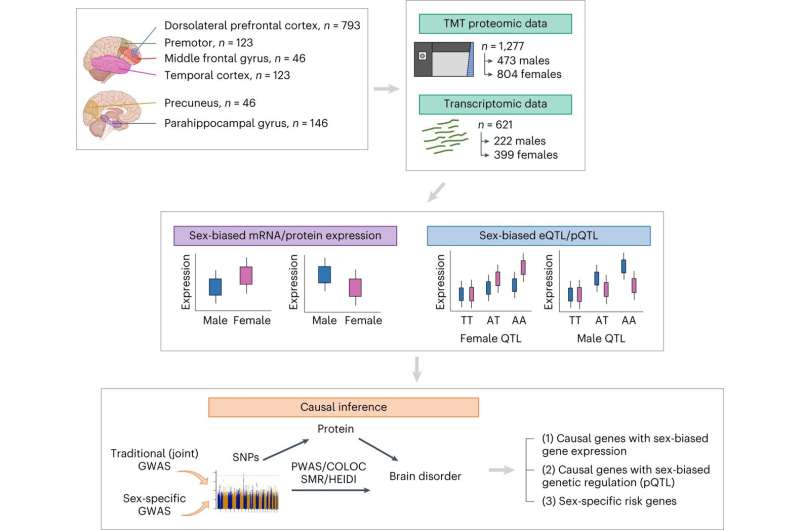
Summary of main analyses. Credit: Nature Medicine (2023). DOI:10.1038/s41591-023-02509-y
An Emory led study published in Nature Medicine and Synapse sheds light on how biological sex influences brain function and its impact on the risk of various brain-related diseases. For decades, it has been observed that many psychiatric and neurological conditions exhibit different prevalence rates between males and females. However, the underlying mechanisms that drive these differences have remained largely unknown.
A research team, led by Aliza P. Wingo, MD, associate professor of psychiatry & behavioral sciences at Emory University School of Medicine and Thomas S. Wingo, MD, associate professor of neurology and human genetics at the Emory University Center for Neurodegenerative Disease, sought to understand how biological sex affects the expression and regulation of proteins in the brain and how that influences brain illnesses.
Using data from more than a thousand brain samples in two community-based longitudinal studies, they compared proteins between males and females and found that around 13% of the proteins were different between the sexes in at least one region of the brain. Some proteins were more abundant in females, while others were more abundant in males.
The team also investigated how genetic variation can influence proteins and found that 5.5% of genes had sex-related differences in both their transcripts (gene messages) and proteins. Importantly, they discovered that the effects of sex on genetic regulation were more prominent at the protein level than at the transcript level.
To understand the significance of these findings, they connected proteins with sex differences to brain-related conditions and found that about 25% of the proteins known to be linked to these brain conditionss had sex-related differences in abundance. Furthermore, they found that certain proteins predipose to brain disorders in one sex but not the other.
This research provides valuable insights into how sex influences brain health and the development of brain-related diseases. It suggests that understanding these sex-related differences could be crucial for a better understanding of mechanisms and for developing treatments for conditions like depression, schizophrenia, alcoholism, and Alzheimer’s disease.
“The goal is to better understand disease,” says Thomas Wingo. “By studying each sex separately and together, we gain a more complete picture of the genes and pathways responsible for these conditions.”
Moving forward, it will be important to conduct larger studies to better understand the influence biological sex has on protein expression, as well as studying other factors that might influence these differences, like environment.
More information:
Thomas Wingo, The role of sex in brain protein expression and disease, Synapse (2023). DOI: 10.7303/syn51150434
Wingo, A.P. et al, Sex differences in brain protein expression and disease. Nature Medicine (2023). DOI: 10.1038/s41591-023-02509-y
Citation:
New study reveals how biological sex influences brain proteins and disease risk (2023, October 5)
retrieved 5 October 2023
from https://medicalxpress.com/news/2023-10-reveals-biological-sex-brain-proteins.html
This document is subject to copyright. Apart from any fair dealing for the purpose of private study or research, no
part may be reproduced without the written permission. The content is provided for information purposes only.
>>> Read full article>>>
Copyright for syndicated content belongs to the linked Source : Medical Xpress – https://medicalxpress.com/news/2023-10-reveals-biological-sex-brain-proteins.html
